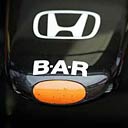
Interview with David Richards
Atlas F1 GP Editor
Jenson Button's maiden podium at the Malaysian Grand Prix last week was the first sign that BAR are coming of age. The team are now in the same position as Renault were last year: the young upstarts that want to shake up the previous order and prove their worth. "We're going to be very cautious," Geoff Willis noted after Button's third place finish. "Where we are trying to compete now there are some very, very strong teams, and I have no intention of underestimating how strong they're going to be." David Cameron quizzed the drivers and leaders of the team from Brackley about the improvements they've made and where do they go from here. Exclusive for Atlas F1
Craig Pollock, though less exuberant, took the path less traveled in Jordan's wake. Armed with a full contact book and a self belief verging on the inhuman, Pollock created British American Racing out of a lot of dreams and a pile of cash from a tobacco company. That achievement in itself was extraordinary, but it is one thing to build a team, quite another to make it succeed.
Statements to the world press that the new team would be competing for victories were defied by results which were so poor that BAR finished behind even Minardi, the perennial back markers, in their first year. A deal that brought Honda back into Formula One the following year was the only notable achievement, and it wasn't enough; the team had no solid plan to push up the grid, and when you add this to infighting among the top executives it wasn't hard to see the dream ending as a nightmare.
By 2001 the rot had well and truly set in at BAR, and the board (in the form of principal shareholders British American Tobacco - BAT) determined to do something about it. Pollock was summarily dismissed as soon as they found a replacement.
The road to last week's podium in Malaysia started when David Richards signed on the dotted line in late 2001. His appointment at the team was necessary and prudent, and his work with new Technical Director Geoff Willis has revolutionised the team's approach to racing. The two men, along with team drivers Jenson Button and Takuma Sato, have brought a sense of belief to a team in which it was sorely lacking.
Richards' love of motorsport started as a child watching the British Rally Championship, and he moved into the sport as early as possible as a co-driver. Moving through the ranks Richards ultimately co-drove, with Ari Vatanen, a Ford to the World Rally Championship (WRC) title in 1981, at which time he quit the sport and formed David Richards Autosport, later renamed Prodrive. The team raced various cars across the Middle East and European rallying circuits, eventually joining the WRC running a BMW M3. Prodrive was the first privateer team to win a round of the championship, at Corsica in 1987.
At the end of 1997 Richards was given the role of chief executive and team principal for the Benetton Formula One team, remaining chairman of Prodrive but delegating responsibility back into his company for the rally programme. Benetton had a successful history in the sport but was flailing, and Richards was seen as the perfect man to turn the team around from the downhill slide that characterized the stewardship of Rocco Benetton.
He started the turnaround, and after a slow start the team managed to limp home in fifth place, but after failing to convince the Benetton family of the need to sell shares in the team to Ford in return for the manufacturer's support Richards left at the end of 1998. Richards returned to Prodrive, and a deal to sell 49% of his company to a venture capitalist firm made him a wealthy man.
In 2000 Richards bought the commercial rights to the WRC from Bernie Ecclestone and set about trying to improve the public awareness of the sport before being offered the job of chief executive at BAR at the end of 2001. Once again he delegated responsibilities in-house at Prodrive before concentrating on the task of rebuilding a Formula One team in his own image.
DC: I guess the place to start is winter testing and the design process of the new car...
David Richards: "Well, really, you've got to go back two and a half years to get to where we are now, because everyone seems to think these things happen by snapping your fingers or that you suddenly pull a white rabbit out of a hat, but these things really happen methodically over time, having a plan and then slowly implementing it. And that's what we've done; we've set about the overall structure of the team two and a bit years ago. You can't build a great car unless you've got the infrastructure right the way throughout the organization. No matter how great a designer Geoff (Willis) is, without the manufacturing processes in place, without the right design support in place, without the quality control procedures in place, nothing happens. All those things had to be put in there."
DC: In a way I guess it's BAR's version of Russia's Five Year Plan.
DR: "It is a little bit, yes."
DC: So how do you implement these things? You obviously had your eyes open when you accepted the position, so what did you look at to resolve the inherent problems?
DC: So there was clearly a lack of management expertise and structure, a lack of ability to delegate efficiently and with purpose?
DR: "There was very little of that."
DC: Why was that?
DR: "There was no one there with the skill set to put it together; that was the problem."
DC: Obviously Geoff coming into the team was a massive boost in that respect, but what else would you say improved the position of the team in a substantial way?
DR: "You'd better ask Geoff that, because whatever car he designed, whatever ideas he had, if it wasn't possible to implement them throughout the organisation then it wouldn't happen. As I say, if he didn't have the right design support and the right people in there, if the manufacturing processes weren't there, and if the quality control wasn't there then none of those things would have happened anyway. And the budget controls, the financial controls; the team was over budget every single year by miles. We met our budget last year, we hit our budget this year and for two years now in a row, and been spot on. And all those disciplines are required to be put in place, and they just didn't exist. That was our job; that was Nick Fry's and my job."
DC: So Geoff just came in and identified what he needed, and told you to sort it out?
DR: "Exactly."
DC: In winter testing Jenson did a very quick lap on fumes in Valencia, but then in Barcelona he was second fastest on consistent laps, which is a real achievement. So what has changed to allow this?
DR: "Well, everything's changed, from the engine to the aerodynamics to the suspension; every last detail of the car has changed. It's an evolutionary process; this is no great revolution. Ferrari; how long did it take Jean Todt to get them into the position they're in? He was actually winning successfully after about five years, and it was just methodical going about it. What you do is just keep going around the organisation looking at the weakest links, trying to plug the gaps and improve every single aspect, and the culmination of that is the evolutionary process around the car, and it improves the quality, improves every aspect of it."
DR: "There's a certain element of that, but the reality is that how you use your people and how you use your resources is as important as how big your resources are. When I came to BAR the first thing they told me was we haven't got enough budget, we haven't got enough people, and we haven't got enough resources. So I cancelled the programme for the second windtunnel, I reduced the staff by 20%, and cut the budget back by 10%. It's about how you use resources; it's about proper management of an organisation. You know, no matter how talented the drivers are, no matter how talented the design team are, if you haven't got the proper management there, proper leadership there, you won't achieve anything."
DC: Is the team at the size that you think it should be?
DR: "It's about right. I think our target is just to be more and more efficient, and we're driving down costs at all times at the moment; we've got a very big purge on in our purchasing side, and we've got all processes on the manufacturing side, and we're looking forward to another very big step forward on efficiency at the moment I think."
DC: On the manufacturing side, how do you look at the difference between in-house and bought-in manufacture?
DR: "You do it on a pay back; you do a cost analysis on it and decide whether it's better to buy a piece of machinery and make it yourself or whether to outsource it, and look at quality controls, secure the reliability of suppliers and so on."
DC: Formula One is a very different industry than most other manufacturing industries - you can certainly buy in product, but the time element is more of a key than in most other industries - does that lead you to factor more towards in-house?
DR: "It depends how efficient you are really at purchasing; we've got a team on purchasing at the moment, and when I came on we had 1,700 suppliers which is just ludicrous; we'll be down to 500 suppliers by year end, and each one of them will be quality monitored, each one of them will have to pass rigourous quality controls with us of course, and if they don't then we'd chop them off our list straight away. And with internal sources we look at machinery purchasing and that sort of thing, we look at the pay back on all that."
DC: The tabloid question: there is a noticeable improvement in team morale around here nowadays; it's been improving for a while, and was very noticeable late last year and certainly this year. How much of that is attributable to Jacques no longer being involved with the team?
DR: "Well again I don't think you can pin it down on one individual; I think it's more part of the team building its self esteem, building its confidence, and feeling that they are making progress. I think that when teams feel they are making progress they bond together better, and they have a sort of better ambience around the team as well. So I think that's been progressively happening over a period of time, and a lot of it you haven't seen; below the surface if you like."
DR: "Well it's that, but you know this is so complex. To give you a clue, all the middle management has been doing total management training for the last eighteen months; we've put them all through management training. There had been no management training before in the organisation, and we're giving the people the skills to do their job effectively, giving them the responsibility, delegating appropriately to them. And there are all these processes all the time; we have quite a large HR operation in the company now, and they are managing that programme now.
We have a team building exercise going on in a month's time with the entire organisation inside the factory, making sure every single person inside the company is aware of their responsibilities and making sure they are aware of the objectives and goals of the organisation this year as well. You ask anyone in the team and they know what our objectives and goals are for the year; it's indelible in everyone's mind."
DC: So what are they?
DR: "They are internal goals."
DC: But as an overall team, what do you see as the goals for the year?
DR: "This year we must take another step forward, and finish in the top four of the championship this year. This means that we have to be in a position to score regular podium positions, and we've got to improve the reliability that we had last year."
DC: Podiums can come from strange races; you could have rain, or crashes, or whatever; but leaving those aside how many podium finishes are you targeting?
DR: "Well you can't leave those aside; you've got to say out of eighteen races in the year do you think we'll be on the podium. I would expect us to be on the podium for a third of the races."
The days of entrepreneurial management in Formula One are over. In the past men like Ken Tyrrell and Walter Wolf, self made men who succeeded in the outside world and who had a passion for motor racing, were able to come to the sport and succeed with a combination of street cunning and money, but those days are gone for good.
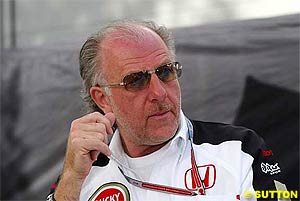 For a recent example of this truism you need look no further than the ignominious decline of the formerly talismanic Jordan team, led by their charismatic ring leader Eddie Jordan through good times and, latterly, bad. Jordan was always seen as a fun place to be, the rock and roll team that thought it could succeed by turning up and out-promoting the rest of the teams rather than looking at the processes of the successful and emulating them.
For a recent example of this truism you need look no further than the ignominious decline of the formerly talismanic Jordan team, led by their charismatic ring leader Eddie Jordan through good times and, latterly, bad. Jordan was always seen as a fun place to be, the rock and roll team that thought it could succeed by turning up and out-promoting the rest of the teams rather than looking at the processes of the successful and emulating them.
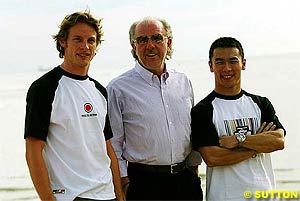 The team was also competing in the British Touring Car Championship, and won the title (also with an M3) in 1988. The following year a legendary partnership was formed when Subaru approached Prodrive to run their rallying programme. The results speak for themselves: under Richards' control Subaru won the British Rally Championship in 1991, 1992 and 1993, the WRC Drivers' Championship (with Colin McRae, and sponsored by BAT brand 555) in 1995 and the WRC Manufacturers' Championship in 1995, 1996 and 1997.
The team was also competing in the British Touring Car Championship, and won the title (also with an M3) in 1988. The following year a legendary partnership was formed when Subaru approached Prodrive to run their rallying programme. The results speak for themselves: under Richards' control Subaru won the British Rally Championship in 1991, 1992 and 1993, the WRC Drivers' Championship (with Colin McRae, and sponsored by BAT brand 555) in 1995 and the WRC Manufacturers' Championship in 1995, 1996 and 1997.
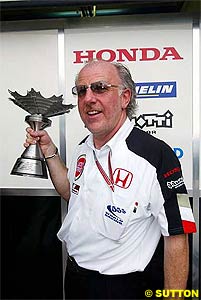 DR: "We looked at every last thing, and just went through it. To be perfectly honest there were good facilities, and a lot of people, but no structure. Something that's taken us two and a half years to do can't be explained in two minutes. You can't just identify one area either. I think there was a lack of structure about the way things were done; there was a lack of knowledge about what the true standards were."
DR: "We looked at every last thing, and just went through it. To be perfectly honest there were good facilities, and a lot of people, but no structure. Something that's taken us two and a half years to do can't be explained in two minutes. You can't just identify one area either. I think there was a lack of structure about the way things were done; there was a lack of knowledge about what the true standards were."
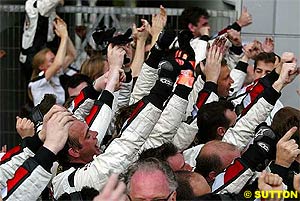 DC: There was a period not so long ago where the teams went through an employment boom, and kept pulling more and more people into the team - is that process still ongoing?
DC: There was a period not so long ago where the teams went through an employment boom, and kept pulling more and more people into the team - is that process still ongoing?
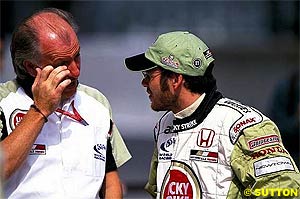 DC: What is it that's been driving this improvement in team morale? Is it just the improvement in results?
DC: What is it that's been driving this improvement in team morale? Is it just the improvement in results?
|
Contact the Author Contact the Editor |
Please Contact Us for permission to republish this or any other material from Atlas F1.
|
Volume 10, Issue 13
Atlas F1 Exclusive
Interview with David Richards
Interview with Geoff Willis
Interview with Jenson Button
Interview with Takuma Sato
Articles
Every Other Sunday
The Paint Job: Part IV
Telling Teammates Apart
2004 Bahrain GP Preview
2004 Bahrain GP Preview
Bahrain GP Facts & Stats
Columns
The F1 Trivia Quiz
Bookworm Critique
On the Road
Elsewhere in Racing
The Weekly Grapevine
> Homepage |
